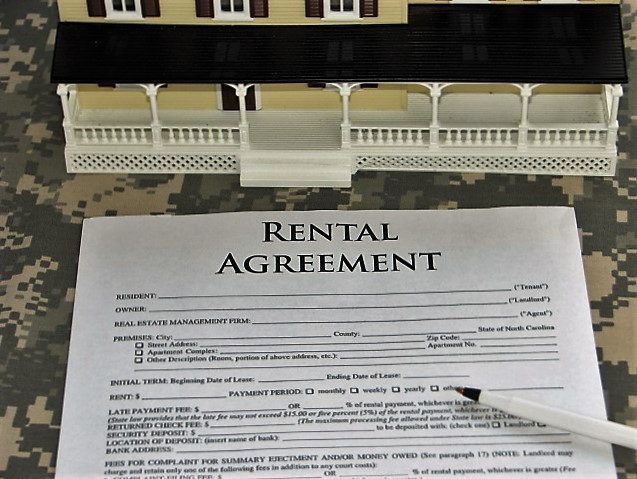Military Landlords
Military Landlords
Being a Military Landlord is one of the hardest decisions you could make when PCSing. It's not easy deciding to rent out your house while you're stationed in another part of the world.
How do you keep control of your investment so far from it?
It's important to find that perfect property management company that understands and works with the military. Property management companies deal directly with real estate agents and prospects for your property. They save you time and worry over marketing your rental, collecting rent and any maintenance fees, take care of complaints and even pursue evictions on your behalf.
Most property management companies bring experience to the property and gives you peace of mind, however it comes at a price. Some property management companies are very expensive while others can be less expensive. So be prepared to negotiate. Everything in real estate is negotiable but remember you get what you pay for.
Here are some very important questions to consider when interviewing a property manager.
-
Cost: Generally property management fees run anywhere from 5% as high as 20% per month. The old analogy is remember “YOU GET WHAT YOU PAY FOR”. Look for the company that provides the most service for your cost.
-
The Termination of your Agreement: If your relationship with your property management company doesn't work out. You want to know up front exactly what it takes to terminate your agreement. Is there a charge for breaking your contract or is there any penalties. ASK!!
-
Communication between you and the Property Management Company: This is the most crucial part of being a military landlord. If you don't have contact with your property management company, how can you expect anything to be done? You want to let companies know up front where you stand and make sure they are willing to be flexible to your needs as a military member. Are there online portals on which to communicate for both you and who may rent out your property?
-
Any Repairs and Maintenance: Does the company have its own maintenance crew? Sometimes when they have their own crew they have a tendency of overcharging you, so be careful. Do they contract out for repairs and have other contractors that they may use?
-
What is the Maximum Repair amount without asking?: Normally most property management companies will have a maximum amount of money set aside for repairs without asking for permission. What that means is they may hold about 100 to 200 dollars of your money in an account for any repairs that may come up for your property. Make sure that whatever the maximum amount is that they can utilize for repairs is set and anything over that they must contact you.
-
Monthly Statement: Does the company send out monthly statements or are they posting it online? Are all repairs annotated on the monthly statements? I really wouldn't deal with anyone that doesn't provide monthly statements for income and expenses on your property.
-
Evictions: How will the company handle any evictions? What are the costs of the eviction? This is a cost that you as a homeowner would have to provide. This is not normally an expense the company would provide.
-
Military clause for military renters?: This is a big one for military landlords!! Because most military members think if they have any problems with their tenants that are military, that they can personally resolve it. The Service Members Civil Relief Act (SCRA) covers what can be done. You as a military member should be very aware of the SCRA and know what it means.
-
Do they as a company understand the Service Members Civil Relief Act (SCRA)
-
Advertising: Where do they advertise at? Are rent signs put on the property? Do they have a website? How many?
-
Vacancies: Most property management companies will offer bonuses to real estate agents that may bring a potential client to rent your property out. This is an expense you would pay for and it's totally up to you the amount. Some companies may offer 10% to 20% of the first months rent for bringing the client.
-
How long have you been in business as a property management company?: This is always a good question to ask because you don't want a fly by night company handling your property. Some of the things to watch out for is companies being run out of the agents home. The best thing to do is look for a reputable company who you feel comfortable with and the most important thing, communication.
Service Members Civil Relief Act (SCRA) 
-
Evictions
-
Default judgments
-
Stay or postponement of court
-
Administrative proceedings
The primary purpose of the SCRA is to ease legal and financial burdens on the Military personnel and their families brought on by the demands of the Active duty Military. Some of the provisions that were enacted to protect the Military Member include:
-
The ability to terminate property leases. You can generally get out of or terminate without penalty any Residential and Business property lease that began before your active duty assignment.
-
You can also terminate a lease you signed during Active Duty in the event of a change in permanent duty station (PCSing Orders).
-
If the Military Member is being deployed for more than 90 days or more. The service member must provide written notification of cancellation to the Landlord or Property Management Company. A VERBAL NOTICE IS NOT ENOUGH.
So one question that is asked quite often is, how much notice do I need to give my landlord? First of all the notice MUST BE IN WRITING and as a concession to the landlord/ lessor the termination is effective 30 days after the first date on which the next rental payment is due and payable and after the notice has been delivered. For example, in the case of a month to month rental if the rental payment is due on the 1st of August and the notice is mailed on the 1st of August then the next rental payment is due on September 1st and the notice would take effect that day and the lease would be terminated on October 1st given that the lessee has left the rental property.
There are a few components that should be highlighted for your knowledge:
-
The Service Member Civil Relief Act makes it clear that any prepaid rents should be returned within 30 days of the termination of the lease.
-
Should be used when a service member is transferring from one duty station to another for a period of more than 90 days
-
This protection covers joint leases, the spouses obligation is terminated along with that of the service member.
-
Termination can be completed by any adult dependent of the service member not just the spouse. For example, an elderly parent that the service member claims as a dependent. An adult dependent is anyone who the service member provides more than ½ of the individual’s support for more than 180 days.
Full and complete details of the Service Member Civil Relief Act can be found in multiple locations on the internet, such as:
www.AmericanBar.org , www.ServiceMembersCivilReliefAct.com , or www.Defense.org
What if I Own My Home and owe more than its worth
One of the biggest issues is the thought of, can I sell my home if I have PCSing orders, what if I can’t sell it and, what if I owe more than it’s worth. New Mortgage Protection
In the world of real estate there are always options that may work for you and your family. Some options may include selling the property or renting the property to another family.
Twelve Factors to Determine if you Should Sell Your Home
-
Will you profit on the sale of your existing home? A good real estate agent is likely to ask you how much you need to sell your current house for and what is the highest price you can pay for a new house? It’s important to run some numbers to find out. Consider these costs (hint: you can look at a previous settlement statement to get estimates):
-
Real estate sales commissions
-
Fees paid at closing: In looking at my last settlement statement we paid some
-
Title charges
-
Government recording and transfer charges
-
Any additional settlement charges
-
Payoff for existing mortgage
-
Home repairs if this is included in the sales contract. Or, perhaps you need to make repairs before putting your house on the market.
-
Pre-sale preparations such as landscaping, painting, etc.
You’ll need to know how much your house is worth and what you plan to list it for on the market. Your real estate agent can help by pulling comps to show you what other houses are selling for in your area. Contact a Certified Military Relocator in your area.
If you have good cost estimates and a realistic sales price, you should be able to determine if you can expect to walk away from the deal with any profit, or get the cash back that went into purchasing your house.
-
Make sure the price is right. Remember that you can’t just list your house for whatever your heart desires. Basic economics applies to the housing market. There is a price point for every area in which people will buy unless it’s a special circumstance. You just have to find that price point and consider whether or not it is going to leave you with a profit or loss in consideration of the costs.
-
How much will it cost to get into the new house? Once you know how much you’re expected to make on the sale of your house, consider the costs to get into a new house:
-
Costs associated with the new loan
-
Title charges
-
Government recording and transfer charges
-
Prepaid expenses such as insurance and taxes or reserves deposited with the lender
-
Moving costs
-
New house purchases (such as window coverings (if not a new house).
Do you still have any cash left after these costs for a down payment? If so (or not), you should be able to determine how much house you can afford. Though each loan program has different qualifying ratios you will need to speak with a VA loan advisor for more specific information. After meeting with a loan advisor you’ll be able to determine the purchase price required to make those numbers work.
-
What interest rate can you get for your new loan? Determine current interest rates for home loans. I would also recommend contacting some lenders to find out in advance how much you can qualify for, but don’t consider that amount your purchase price. Know what you can afford and use the estimates to make sure you can get a loan with a good interest rate. At the time of this class, interest rates are still at a historically low point, so this is definitely some added incentive.
-
Consider how long you’ve been in your house. It’s often said you need to be in your house 5 years to recover the costs associated with the original purchase. Perhaps there is less to consider here if you can sell your house for enough to get all of your money back and more. But if your house price isn’t as high as you had hoped for and you’ll lose money, it may be wise to wait until the housing prices rise. Or until you can cover original costs and make some money for a down payment.
-
Do you have a good reason to sell? Is selling a need or a want? Your real estate agent is probably going to ask you why you are selling. In fact, anyone looking at your house will probably ask this question. Many people have a need to sell such as a job change, or necessary relocation. Others just want a new house. The point is really evaluating the necessity of selling. There is a lot to consider and it can be a stressful time if not well planned. So, before you put the sign in the front yard because the bathroom isn’t the right color, consider making a list of the reasons to move and ask yourself if it’s really worth the effort.
-
Consider the home or house thing and try to remove emotions. Do you live in a home, or do you live in a house? Most men would agree it’s a house. But most women look at it well beyond the roof over our heads and see it as a home. Women will typically look at new houses (or homes) in the same way. While the differences can be humorous, the point is both men and women have to take the emotion out of selling. Truthfully, you have to view it as selling a house because that is how the market looks at it. The pictures, painting and drapes that can make it homey, don’t count when selling.
-
Are you willing to put forth the work required to sell your house? There is certainly something to think about here if you are trying to sell an older home. Actually, even with selling a newer home you might expect to do some minor repairs to make it market ready. Anytime you get ready to list you want to make sure your house is visually appealing. Outside it’s always a good idea to have fresh mulch in the landscaping, flowers and a neat looking yard. The inside of your house needs to be organized and in order. If you can’t organize it others might think there isn’t enough space, etc. If you’re serious about putting your house on the market, try to make it model home ready. But keep in mind it’s going to require some work and time.
-
Is there a lot of competition? You and your real estate agent need to evaluate how you will handle the competition within your neighborhood, or even around the same area. What sets your home apart from others? Do you have some upgrades and are you priced better than others? Do you have a bigger back yard? Consider what is going to make your house sell in comparison to a similar house down the street.
- . What is the overall condition of your house? Conditions of your house definitely matter in a lot of cases, especially if you’re in a market to sell to a family. Again, make sure you consider repair costs or preparation of your house before listing it. Think again if you’ve been putting off fixing that toilet that doesn’t flush properly, or perhaps patching the hole in the wall where little Johnny swung his baseball bat too hard. The little things count when showing your house and you have to be willing to put forth some prep effort.
-
Consider the Proximity to the local Base/Post. When you are selling your home the proximity to the base may help or hinder your sales process.
-
Time frame of Sell Desired When deciding to sell your home it is important to decide if your desired timeframe will factor into the selling of your home. Remember it normally takes about 30 days to close a loan on a property if there are no hiccups along the way. Those 30 days do not factor in finding the buyer for the home. Make sure you understand the average time on market for your price point and area when considering if you should sell your home. But most of all “DON’T WAIT TILL THE LAST MINUTE TO SELL AND EXPECT A MIRACLE FROM YOUR REAL ESTATE AGENT”
Renting Out your Current Home
There comes a time when you realize that your home may not sell in the current market, maybe there are too many other homes for sell, maybe you just haven’t built enough equity in your home to sell it without losing money at the time, or it might have been planned to turn this home into an income producing rental. Whatever the reason making the decision to turn your home into a rental property is a tough one for many Military people. But where do you start? First, you face the tough question of who will manage your home in your absence. Generally you have 2 choices, including:
-
Managing your home yourself
-
Hiring a Professional Full Service Property Manager
Each choice comes with numerous benefits as well as drawbacks; briefly to give you the larger picture, here are the Pro’s and Con’s.
Should I be a Do It Yourself Landlord
|
PRO |
CON |
|
|
Though you save money what will you do when issues arise such as:
|
Should I Hire a Professional Full Service Property Manager
|
PRO |
CON |
|
A Professional Property Manager will have a long list of services they will provide you, some of the most common include the following:
|
There will be a fee that will be charged, generally monthly, could be anywhere from 9-10% of gross monthly rents Ex: Rent amount is $1,000.00 with a 10% management fee. You will collect 900.00 unless there were other fees or repairs. |
Benefits of Renting out My Home
When weighting the benefits of renting out or selling your current home there are some benefits that one normally might not consider when it comes to renting out a home. Some of these benefits include the following:
-
Continue the growth in equity in the home
-
Possible tax deductions (speak to your Tax Advisor for more details)
-
Positive impact on credit reporting
Check with a local Certified Military Relocator (CMR) who can assist you in what the market is doing to better help you in that decision.


